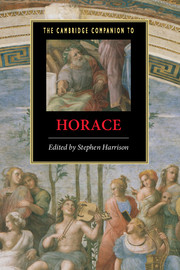Book contents
- Frontmatter
- Introduction
- Part 1: Orientations
- Part 2: Poetic Genres
- Part 3: Poetic Themes
- 12 Philosophy and ethics
- 13 Gods and religion
- 14 Friendship, patronage and Horatian sociopoetics
- 15 Wine and the symposium
- 16 Erotics and gender
- 17 Town and country
- 18 Poetics and literary criticism
- 19 Style and poetic texture
- Part 4: Receptions
- Dateline of works and major political events
- Works cited
- Index
16 - Erotics and gender
from Part 3: - Poetic Themes
Published online by Cambridge University Press: 28 May 2007
- Frontmatter
- Introduction
- Part 1: Orientations
- Part 2: Poetic Genres
- Part 3: Poetic Themes
- 12 Philosophy and ethics
- 13 Gods and religion
- 14 Friendship, patronage and Horatian sociopoetics
- 15 Wine and the symposium
- 16 Erotics and gender
- 17 Town and country
- 18 Poetics and literary criticism
- 19 Style and poetic texture
- Part 4: Receptions
- Dateline of works and major political events
- Works cited
- Index
Summary
Horace has always been a poet more for men than for women. By comparison with the contemporary poets whose work we know (Virgil, Tibullus, Propertius, Ovid), Horace shows relatively little interest in the life of love, which is where Latin literature tends to locate its women. Though Horace is, for most readers today, the poet of the Odes above all, it is worth remembering that roughly half his poetry consists of the hexameter Satires, Epistles and Ars Poetica, poems in which women have at most a marginal existence. And this marginalisation is not an accidental but a constitutive feature of the hexameter poems, thickening their characteristic 'men’s club' atmosphere. At the end of his debut collection, Satiresi, Horace submits his poetry to the judgement of his ideal readership, a star-studded list of masculine proper names (Maecenas, Virgil, Pollio, et al.) forming the strongest possible contrast to the nameless females (distant ancestors of Hawthorne’s 'damned mob of scribbling women') who seek instruction from Horace’s poetaster-rivals: 'As for you, Demetrius, and you, Tigellius: go and whine to your classroom of ladies in armchairs' (Demetri, teque Tigelli, / discipularum inter iubeo plorare cathedras, Satires 1.10.90-1). A similar exclusion marks Horace’s last venture in hexameters, the Ars Poetica, which opens with Horace inviting his (male) friends to join him in laughing at an ineptly imagined painting of a monstrous female nude - thus from the very outset casting men as the knowing critics, and women as the matter but not the producers or consumers of (Horatian) art.
- Type
- Chapter
- Information
- The Cambridge Companion to Horace , pp. 221 - 234Publisher: Cambridge University PressPrint publication year: 2007
- 5
- Cited by



